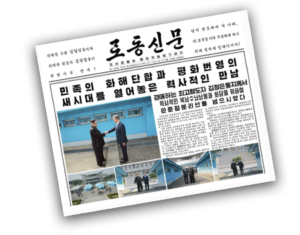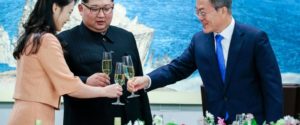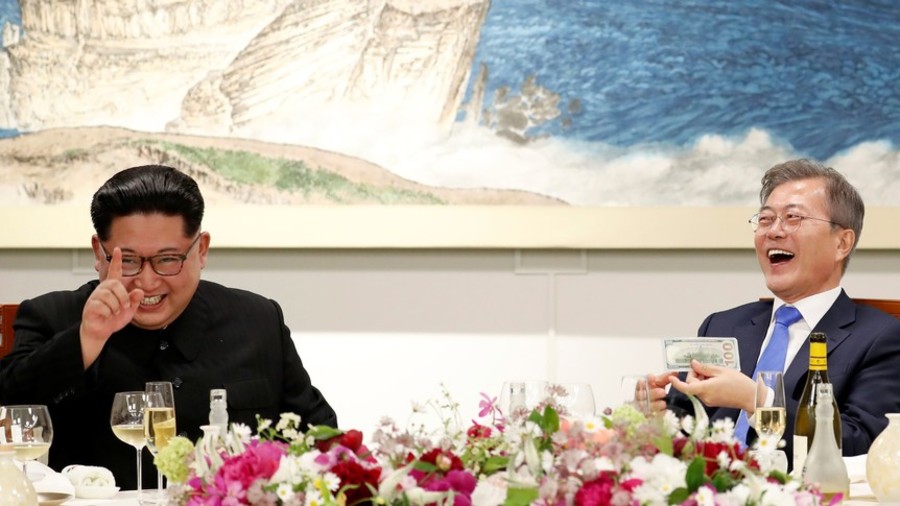
Experts in the United States are regarding the success of Friday’s summit as a positive sign for the Trump-Kim meeting planned in the coming weeks, while cautioning against excessive . optimism. Image: North Korean Newspaper
BEIJING, April 28 (Xinhua) — The world welcomed the two Koreas’ joint commitment to denuclearization and permanent peace on the Korean Peninsula at Friday’s summit, looking forward to the next key meeting between U.S. President Donald Trump and Kim Jong Un, top leader of the Democratic People’s Republic of Korea (DPRK).
At the end of the summit between Kim and South Korean President Moon Jae-in held on the South Korean side of the border village of Panmunjom, their Panmunjom Declaration for Peace, Prosperity and Unification of the Korean Peninsula pledged joint efforts for national reconciliation, denuclearization and lasting peace.
HISTORIC SUMMIT EXPECTED TO LEAD TO PEACE

THE RUSSIAN TAKE: …. The United States is a country that, at any given time, is bombing at least seven (or eight) different countries, all the while threatening to bomb at least two or three more. Despite these unprecedented acts of aggression, North Korea – currently bombing no one – is inexplicably and without fail, the country that is universally branded as an uncontrollable threat to global security. “It’s time to bomb North Korea,” wrote former government advisor Edward Luttwak in an opinion piece for Foreign Policy in January this year. No, it isn’t. In fact, if I recall correctly, the US already bombed North Korea at least once before, committing an endless supply of potential war crimes in the process… In the early 1950s, the US bombed North Korea so relentlessly that, according to DPRK, it destroyed over 8,700 factories, 5,000 schools, 1,000 hospitals, 600,000 homes, and eventually killed off perhaps 20 percent of the country’s population. As noted by the Asia Pacific Journal: “By the fall of 1952, there were no effective targets left for US planes to hit. Every significant town, city and industrial area in North Korea had already been bombed. In the spring of 1953, the Air Force targeted irrigation dams on the Yalu River, both to destroy the North Korean rice crop and to pressure the Chinese, who would have to supply more food aid to the North. Five reservoirs were hit, flooding thousands of acres of farmland, inundating whole towns and laying waste to the essential food source for millions of North Koreans.” No one considers this historical incident worth mentioning when discussing the so-called “threat” of North Korea. And this is only going to get worse. Not too long ago, Donald Trump’s now national security advisor, John Bolton, wrote an op-ed article published by the Wall Street Journal (WSJ) entitled “The Legal Case for Striking North Korea First.” This is an idea so catastrophic that about a week later, the WSJ had no choice but to publish the counter viewpoint entitled “Striking North Korea First Is a Bad Proposal.” …. For North Korea, full denuclearization entails the complete withdrawal of all nuclear-capable US weapons within reach of the peninsula, as well as the withdrawal of its 28,500 troops from South Korea.This is a deal-breaker for Washington and may prove to be a sticking point, especially given that the US military still refuses to leave Japan, despite improved diplomatic relations in the decades following the end of World War Two and in addition to recent protests, some of which have last for over 5,000 consecutive days. It is also the same reason that the US still has bases in Germany and troops in the Philippines where it is expected to increase its military footprint, even though it was formally kicked out of the country in 1991. Let’s face it, the US hardly ever leaves a country once its military has established a presence. Consider that in Syria, the US controls almost one third of the country, including Syria’s most oil-rich region, without any discernable legal basis to be there in the first place. In other words, the US may pursue an inevitable, collapsible deal similar to the Joint Comprehensive Plan of Action (JCPOA) reached with Iran in 2015, but ultimately it will never give North Korea the security that it seeks. Putting aside one’s own thoughts of the North Korean leadership, it was the US who destroyed North Korean livelihood to the point of no return in the early 1950s. Remember that Americans still struggle to reconcile with a lone attack on its sovereignty that took place seventeen years ago; surely in that context one can try to understand the plight of the North Korean people. The US has over 1,000 military bases worldwide, has a military budget of $700 billion and a nuclear weapons stockpile so sophisticated that it could make entire continents uninhabitable. A war with North Korea would be no major challenge to the US. No, North Korea is a threat for the same reason that Iraq, Libya, Afghanistan, Syria and Iran are a threat: natural resources and the ability to tie the development of those resources to a currency that will challenge the status of the US dollar. You see, North Korea sits on reserves of more than 200 minerals, including rare earth minerals, which are believed to be worth up to 10 trillion USD. N
United Nations Secretary-General Antonio Guterres called the meeting “truly historic” and offered UN assistance to implement the agreements.
“He counts on the parties to build on their first meeting and THE swiftly implement all agreed actions to further inter-Korean trust-building and reconciliation, sincere dialogue, and progress towards sustainable peace and verifiable denuclearization on the Korean Peninsula,” Guterres’s spokesperson Stephane Dujarric said.
Welcoming the joint declaration as “positive” and “conducive”, Chinese Foreign Ministry spokesperson Lu Kang said, “We hope that the relevant parties will maintain the momentum for dialogue and work together to promote the denuclearization of the Peninsula and the political settlement of the Peninsula issue.”
China stands ready to continue to play its positive role to this end, he added.
Trump tweeted: “After a furious year of missile launches and nuclear testing, a historic meeting between North and South Korea is now taking place.”
Moscow said, “We regard it as a significant step by Seoul and Pyongyang toward national reconciliation”, standing ready to facilitate “the establishment of practical cooperation” between them.
European Union foreign policy chief Federica Mogherini said in a statement, “It shows that dialogue and diplomacy are our strongest tools to create peaceful solutions to the most difficult problems, and that they can benefit the region and the whole world.”
Countries in and beyond Asia including the Philippines, Thailand, Nepal and France hailed the outcome of the summit, hoping it would promote regional peace and stability.

FILE – In this April 27, 2018 file photo, South Korean President Moon Jae-in, right, toasts with Ri Sol Ju, wife of North Korean leader Kim Jong Un during a banquet at the border village of Panmunjom in the Demilitarized Zone, South Korea. Some of the most striking images were simply of Kim’s seeming ease and confidence as he navigated the situation, and his quick and frequent smiles. For good measure, he even brought his wife, a former singer who is also quite comfortable in the public eye, and his younger sister, who is his closest confidante and was on hand at almost every turn to hand him statements to sign, adjust his chair and generally look out for her older brother. (Korea Summit Press Pool via AP, File)

POSITIVE SIGN FOR PLANNED TRUMP-KIM MEETING
“We now look forward to the planned summit meeting between the President of the United States and the leader of the DPRK and further positive outcomes that may stem from it,” Mogherini said.

South Korean President Moon Jae-in and North Korean leader Kim Jong Un attend a banquet on the Peace House at the truce village of Panmunjom inside the demilitarized zone separating the two Koreas © Summit Press Pool / Reuters
Ian Bremmer, chairman of the New York-headquartered think tank Eurasia Group, called the outcome of the inter-Korean summit “the first significant unreservedly positive geopolitical development of the year.”
“It’s hard to see the United States credibly threatening military preemption when peace is breaking out across the Peninsula, which is precisely the point,” he said. “Ultimately it’s a win for everybody.”
Richard Haass, president of the U.S. think tank Council on Foreign Relations (CFR), described the summit as an “extraordinary development on Korean Peninsula” that will help defuse tensions that might have slided into military confrontation.
Former U.S. diplomat Mintaro Oba likened the summit to the opening gambit in chess.
“How you play it sets up the other possible moves that come after it,” he said. “So the inter-Korean summit’s significance lies primarily in what atmosphere it creates and what expectations it reinforces heading into the next move, which is the Trump-Kim summit.”
Scott A. Snyder, CFR’s senior analyzer on the Korean Peninsula, said Seoul recognizes that improvements in inter-Korean relations will be ultimately tied to any progress in U.S.-DPRK relations.
A U.S.-DPRK summit will be “high-risk, high-reward” for both Kim and Trump, because failure could entrench their previous opposing stances and lead to further confrontation, he said.
Douglas Paal, vice president for studies at the Carnegie Endowment for International Peace, predicted that with Pyongyang, Washington will “seek to broaden and deepen the meaning of denuclearization and set a timetable for elimination of the weapons, with benchmarks, in exchange for sanctions relief and diplomatic relations.” ( Ryan Hass, a Brookings Institution scholar on Asia issue, said it would be wise for the White House to manage expectations, rather than inflate them.
“It’s going to be difficult for Trump to exceed either the hopefulness of the Moon-Kim meeting or the standards on verification set by JCPOA (Joint Comprehensive Plan of Action) Iran deal,” he said.